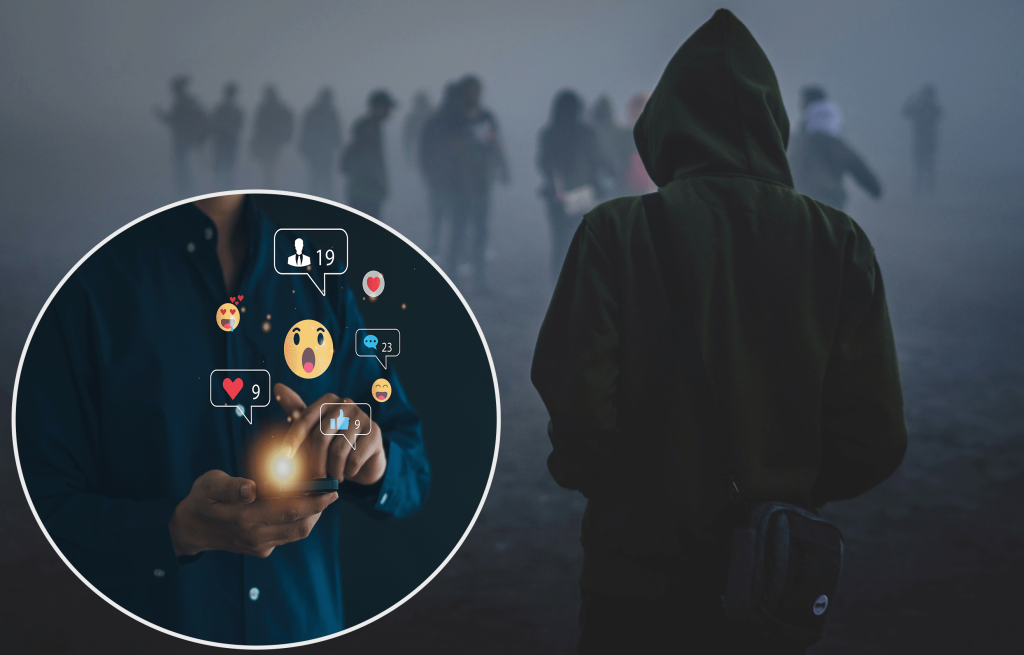SOCIALs
Social media, Online communication, Crime Involvement and Adolescent Lives Study

Social media is everywhere – and for adolescents, it’s a daily habit. In the Netherlands, 88% of children and teens aged 10 to 18 use social media daily, spending nearly three hours every day scrolling and chatting across platforms (NL Times, 2025). Social media has fundamentally transformed how adolescents maintain relationships and communicate with friends and foes. These online spaces offer opportunities for social connection and individual expression, but also present challenges.
One of the challenges is that young people can be exposed to online content and communication that may reinforce or stimulate delinquent behaviour. This includes messages and depictions of violence, ‘fast money’, drug paraphernalia, or direct invitations to engage in crime.
This new reality raises a pivotal question for the study of juvenile delinquency: How does social media impact engagement in adolescent delinquent behaviour?
Project SOCIALs aims to answer this question. This five-year research project explores whether social media content and online peer interactions contribute to delinquent behaviour – and if so, how strong that influence is, how it works and for whom.
Throughout the project, we focus on four key questions:
- Do social media influence delinquent behaviour beyond offline peer influence?
- To what extent and in what ways (long-term, intermediate, short-term) do peer interactions on social media impact adolescent delinquency?
- Which features of social media (like exposure to risky content or peer pressure) have most impact on adolescent attitudes and behaviour?
- Which individual characteristics and circumstances enhance or protect against criminogenic effects from social media?
To answer these questions, the project is divided into four parts- each designed to explore a different piece of the puzzle, with opportunities for teens and families to get involved:
- Pilot study: This phase was already completed in 2025 and laid the groundwork for the main research. It combined qualitative research- including focus groups and interviews with adolescents and their parents- with quantitative surveys among 600 adolescents to gather initial data on social media, peer interactions, and delinquent behaviours.
- Longitudinal Study: An annual survey (January-March 2026, 2027, and 2028) that tracks the same group of 1,000 adolescents over time, helping us see how behaviour and social media use develop and change. During the first wave (in 2026), we also survey 500 parents of these adolescents.
- Smartphone Study: Teens are asked to complete brief questionnaires daily on their phones for a few weeks. This helps us to track changes in social media use, peer interactions, and behavior across days and weeks. For this study, we will invite 250 of the adolescents who also participate in the longitudinal study.
- Virtual Reality (VR) Study: In this part, we use VR to simulate peer interactions in a controlled environment. This lets us explore how teens respond to immediate peer pressure – safely and realistically. For this study, we will invite 250 of the adolescents who also participate in the longitudinal study.
Involved Researchers

Prof. Frank Weerman is senior researcher at NSCR and professor of Youth Criminology at Erasmus University Rotterdam. He is the principal investigator of this project. Frank’s work focuses on the role of peers, problematic youth groups, and the school environment.

Dr. Evelien Hoeben is researcher at NSCR and guest lecturer at the Sociology Department of Utrecht University. She is the co-principal investigator of this project. Her research focuses on the influence of peers, parenting, and situational factors in relation to youth delinquency and substance use. www.evelienhoeben.com

Rhea Mariel Peter joined this project as a PhD candidate in January 2025. Rhea has long been interested in the impact of social and environmental factors on adolescents. Now, her research focuses on understanding the role of social media in shaping adolescent behavior. She is currently collecting articles that demonstrate the link between social media use and delinquency. Rhea’s work will then explore and test the mechanisms that explain this connection, with the goal of better understanding how online interactions contribute to youth delinquency.

Veerle Vijverberg joined the project as a Data Coordinator in March 2025. She holds a Master’s degree in Research Psychology from the University of Amsterdam (UvA), completed in 2024. Veerle’s academic focus lies in understanding how young people develop and interact with one another. Prior to this role, she worked as a Lab Manager at UvA’s ConnectedMinds Lab, where she supported data collection for a project on social influence. Additionally, she gained experience as a Research Assistant at Utrecht University for the MultiTal3nt project, which explored the perspectives of multicultural students on their multicultural identities and its connection to creativity. As Data Coordinator, Veerle will work closely with schools to facilitate the data collection process.

Anke joined this project as a postdoctoral researcher. Her research focuses on adolescents’ long-term developmental trajectories as well as their moment-to-moment behavioral and emotional experiences. She investigates changes in behavior and well-being over time, alongside the influence of factors such as social media use, emotion regulation, and emotional dynamics. In her work, she highlights the role of social contexts, including peers, parents, and teachers, in shaping adolescents’ behavior and well-being.
Collaboration
Prof. Jean-Louis van Gelder is the director of the Max Planck Institute for the Study of Crime, Law, and Security, Germany, and a full professor at the Institute for Education and Child Studies, University of Leiden, The Netherlands. His research interests focus on the role of emotions and personality in criminal decision-making, the applications of novel technologies such as virtual reality to the study of crime, and the relation between short-term mindsets and criminal behavior.
Dr. Tim McCuddy an Associate Professor of Sociology at the University of Memphis, is also a co-investigator. His research explores how schools, neighborhoods, and social media impact youth crime and victimization.
Information for Adolescents
Information for Parents
Information for School Personnel
Newsletters
Sign up for the newsletter using this link.
Get in touch
For more information about this research, please contact us via our project contact details.
06-25490826 (Phone/Whatsapp/Signal) | Projectsocials@nscr.nl

